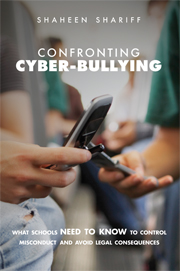 Confronting Cyber-Bullying
Confronting Cyber-Bullying Published online by Cambridge University Press: 02 July 2009
SNERT … That's what some call the trouble-makers of cyberspace. Attributed to Kurt Vonnegut, the term stands out for “Snot-Nosed Eros-Ridden Teenager.” It concisely captures much of what many cyberspace deviants are all about. They thumb their noses at authority figures and smear their discontent all over themselves and others.
(Suler & Philips, 1998)INTRODUCTION
This chapter is a reiteration of the background on bullying that I have provided in my book on teaching and parenting issues (Shariff, 2008). It is important that readers who are interested in the law and policy aspects gain insight into the forms and complexities of bullying and cyber-bullying. This is especially important for legal practitioners, academics, and judges, because their understanding of its nuances could make an enormous difference in adjudicating cases of cyber-bullying, or even in negotiating settlements with parents and victims.
WHAT IS BULLYING?
Bullying among school children is certainly an old phenomenon, although it was not until the early 1970s that it was made the object of systematic research. In schools, bullying usually occurs in areas with minimal or no adult supervision. It can occur within or around school buildings, although it more often occurs in physical education classes, hallways, bathrooms, or classes that require group work, as well as during after-school activities. Bullying in school sometimes consists of a group of students taking advantage of or isolating one student in particular and outnumbering him or her.
To save this book to your Kindle, first ensure no-reply@cambridge.org is added to your Approved Personal Document E-mail List under your Personal Document Settings on the Manage Your Content and Devices page of your Amazon account. Then enter the ‘name’ part of your Kindle email address below. Find out more about saving to your Kindle.
Note you can select to save to either the @free.kindle.com or @kindle.com variations. ‘@free.kindle.com’ emails are free but can only be saved to your device when it is connected to wi-fi. ‘@kindle.com’ emails can be delivered even when you are not connected to wi-fi, but note that service fees apply.
Find out more about the Kindle Personal Document Service.
To save content items to your account, please confirm that you agree to abide by our usage policies. If this is the first time you use this feature, you will be asked to authorise Cambridge Core to connect with your account. Find out more about saving content to Dropbox.
To save content items to your account, please confirm that you agree to abide by our usage policies. If this is the first time you use this feature, you will be asked to authorise Cambridge Core to connect with your account. Find out more about saving content to Google Drive.